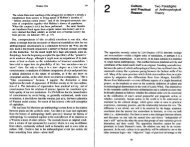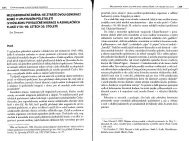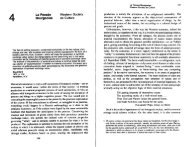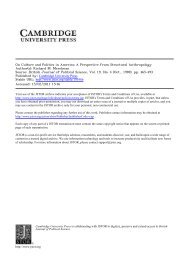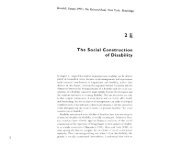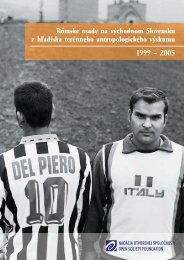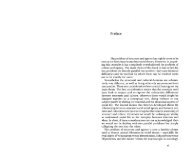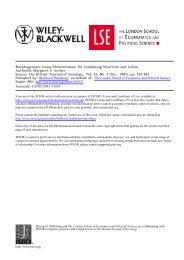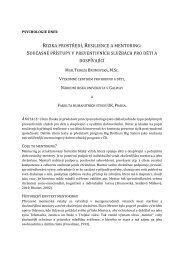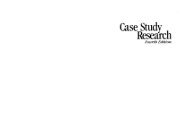Understanding Harry Potter: Parallels to the Deaf World - Moodle
Understanding Harry Potter: Parallels to the Deaf World - Moodle
Understanding Harry Potter: Parallels to the Deaf World - Moodle
Create successful ePaper yourself
Turn your PDF publications into a flip-book with our unique Google optimized e-Paper software.
Endnotes 443<br />
observations that contribute <strong>to</strong> our appreciation of literature<br />
and <strong>the</strong> human condition. In order <strong>to</strong> do this we<br />
have developed a ‘‘<strong>Deaf</strong> Studies Template’’ (Czubek &<br />
Greenwald, 2000). The template uses <strong>the</strong> following<br />
categories for literature analysis: Only in <strong>the</strong> <strong>Deaf</strong> <strong>World</strong>,<br />
Minority Issues (including Identity and Oppression),<br />
Institutions, and, finally, Edenic Narrative.<br />
Using this template we have identified remarkable<br />
parallels between <strong>Harry</strong> <strong>Potter</strong>’s world and <strong>the</strong> <strong>Deaf</strong><br />
<strong>World</strong>, effectively changing how we look at <strong>the</strong> <strong>Harry</strong><br />
<strong>Potter</strong> series and all literature. The template is a <strong>to</strong>ol<br />
that helps organize elements of s<strong>to</strong>ries and relate <strong>the</strong>m<br />
<strong>to</strong> common <strong>the</strong>mes from <strong>the</strong> <strong>Deaf</strong> <strong>World</strong>. By following<br />
this model, students can begin <strong>to</strong> look for particular<br />
<strong>the</strong>mes in literature, analyzing narratives according <strong>to</strong><br />
<strong>the</strong> four categories outlined above. The categories are<br />
by no means exhaustive, and students are encouraged<br />
<strong>to</strong> expand and create additional ideas of <strong>the</strong>ir own.<br />
The template is designed <strong>to</strong> assist <strong>the</strong>m with comprehensive<br />
literary analyses as <strong>the</strong>y read, using <strong>the</strong>ir own<br />
lives, experiences, and cultures.<br />
Only in <strong>the</strong> <strong>Deaf</strong> <strong>World</strong><br />
This category describes events and experiences that<br />
illustrate distinctive features of life in <strong>the</strong> <strong>Deaf</strong> <strong>World</strong>.<br />
Though <strong>the</strong>re are many parallels between <strong>the</strong> experiences<br />
of <strong>Deaf</strong> people and o<strong>the</strong>r minority groups, <strong>the</strong><br />
following section highlights examples specific <strong>to</strong> <strong>the</strong><br />
<strong>Deaf</strong> <strong>World</strong>.<br />
Unique <strong>to</strong> <strong>the</strong> <strong>Deaf</strong> <strong>World</strong> is <strong>the</strong> phenomenon that<br />
approximately 95% of deaf children are born <strong>to</strong> hearing<br />
parents (Mitchell & Karchmer, 2004). This creates a situation<br />
in which parents and children do not share a language<br />
and culture based on heredity, as is <strong>the</strong> case with<br />
every o<strong>the</strong>r biological family. Hearing parents typically<br />
have not had contact and/or experience with <strong>Deaf</strong> people<br />
and, in many cases, have never met a deaf person.<br />
Similarly, in <strong>the</strong> world of <strong>Harry</strong> <strong>Potter</strong>, wizard children<br />
are born <strong>to</strong> muggle parents and muggle children are<br />
born <strong>to</strong> wizard parents. We believe that <strong>the</strong> <strong>Deaf</strong> <strong>World</strong><br />
is <strong>the</strong> only group in which this occurs. Every o<strong>the</strong>r<br />
minority group has ‘‘minority babies’’ who are ‘‘like<br />
<strong>the</strong>ir parents’’ in terms of language and culture.<br />
Often, deaf children of hearing parents (DCHP),<br />
due <strong>to</strong> innocent parental ignorance or intentional motives,<br />
are not exposed <strong>to</strong> <strong>the</strong> <strong>Deaf</strong> <strong>World</strong> as <strong>the</strong>y are<br />
growing up. We have often seen deaf children comment<br />
that <strong>the</strong>y will become hearing when <strong>the</strong>y turn 18 years<br />
old. <strong>Deaf</strong> children who do not have exposure <strong>to</strong> <strong>Deaf</strong><br />
adults and <strong>the</strong> <strong>Deaf</strong> Community assume that at a certain<br />
age <strong>the</strong>y will become hearing because <strong>the</strong>y have never<br />
seen a deaf person older than <strong>the</strong> students in <strong>the</strong>ir<br />
schools. <strong>Harry</strong> <strong>Potter</strong> also grows up without any idea<br />
about <strong>the</strong> Wizard <strong>World</strong> and who he really is. <strong>Harry</strong>’s<br />
guardians, Aunt Petunia and Uncle Vernon, purposely<br />
deny him information about <strong>the</strong> Wizard <strong>World</strong> and his<br />
heritage. <strong>Deaf</strong> children and <strong>Harry</strong> grow up feeling<br />
alone and ‘‘different’’ than everyone around <strong>the</strong>m without<br />
understanding why. This leaves a tremendous void<br />
in <strong>the</strong>ir lives and highlights <strong>the</strong> critical nature of access<br />
<strong>to</strong> information, language, and <strong>the</strong> truth.<br />
<strong>Deaf</strong> children growing up in hearing families are<br />
often left out of family dynamics for a variety of reasons.<br />
This is also true for <strong>Harry</strong> as he is isolated and<br />
excluded as opposed <strong>to</strong> Dudley, <strong>the</strong> treasured muggle<br />
son of Aunt Petunia and Uncle Vernon, who is included<br />
and knows about everything in <strong>the</strong> family.<br />
On <strong>the</strong> o<strong>the</strong>r hand, <strong>the</strong>re are often cases where<br />
deaf children reportedly ‘‘get more attention’’ from<br />
<strong>the</strong>ir parents and families than <strong>the</strong>ir hearing siblings<br />
do for a number of reasons. Petunia Dursley expressed<br />
<strong>the</strong> same concern when she talked about how her<br />
parents gave more attention <strong>to</strong> her sister, Lily <strong>Potter</strong>,<br />
<strong>the</strong> wizard, than <strong>to</strong> her as <strong>the</strong>y grew up.<br />
<strong>Harry</strong>’s aunt and uncle feel ashamed about having<br />
a wizard in <strong>the</strong> family. Nei<strong>the</strong>r do <strong>the</strong>y acknowledge<br />
<strong>Harry</strong>’s wizardry nor do <strong>the</strong>y speak of Lily and James<br />
<strong>Potter</strong> (<strong>Harry</strong>’s wizard parents). This is often <strong>the</strong> case<br />
for a deaf child in a hearing family.<br />
The idea of normalcy and <strong>the</strong> quest for making<br />
children ‘‘normal’’ is a common <strong>the</strong>me resonating<br />
throughout all <strong>the</strong> Rowling books. <strong>Deaf</strong> people constantly<br />
confront <strong>the</strong> pathological/audist view that <strong>the</strong>y<br />
are a handicapped, abnormal population in need of ‘‘fixing.’’<br />
There are many examples of <strong>the</strong> Dursleys trying<br />
<strong>to</strong> make <strong>Harry</strong> in<strong>to</strong> something he is not. For example,<br />
‘‘we swore when we <strong>to</strong>ok him in we’d put a s<strong>to</strong>p <strong>to</strong> that<br />
rubbish—swore we’d stamp it out of him’’ (Rowling,<br />
1997). This parallels <strong>the</strong> experience <strong>Deaf</strong> children<br />
may confront when <strong>the</strong>ir families opt for cochlear implants<br />
and refuse signing and o<strong>the</strong>r measures, intending



